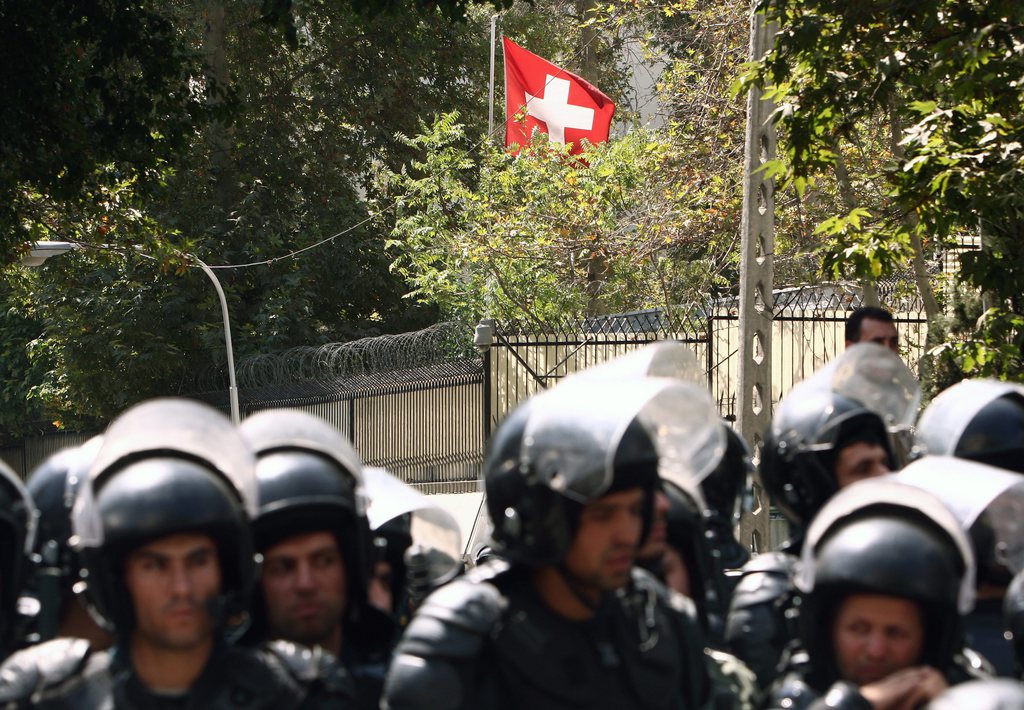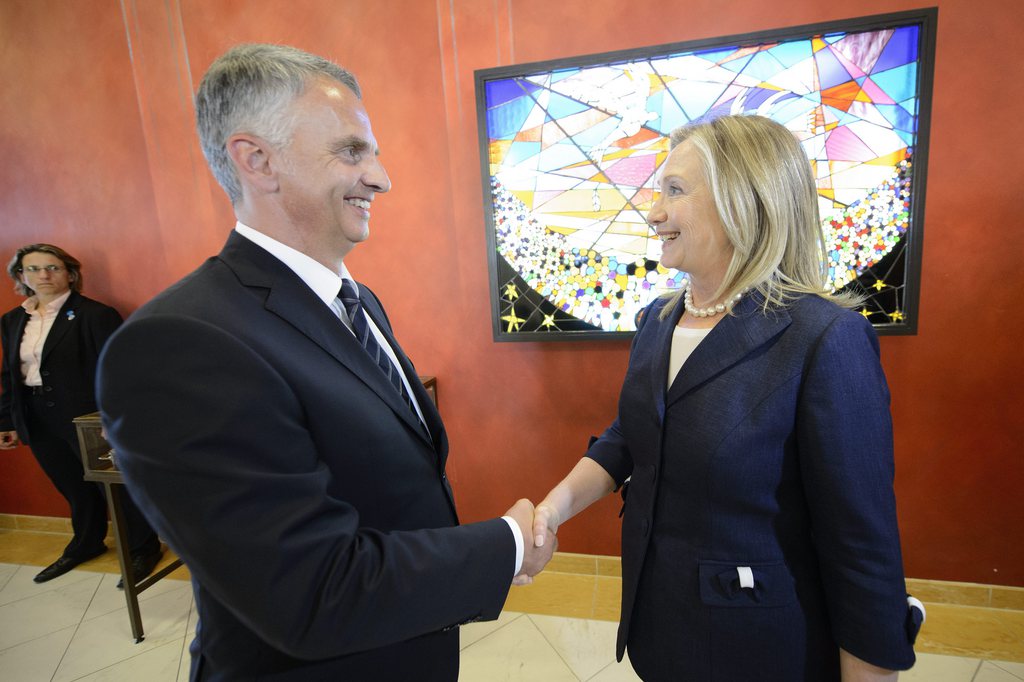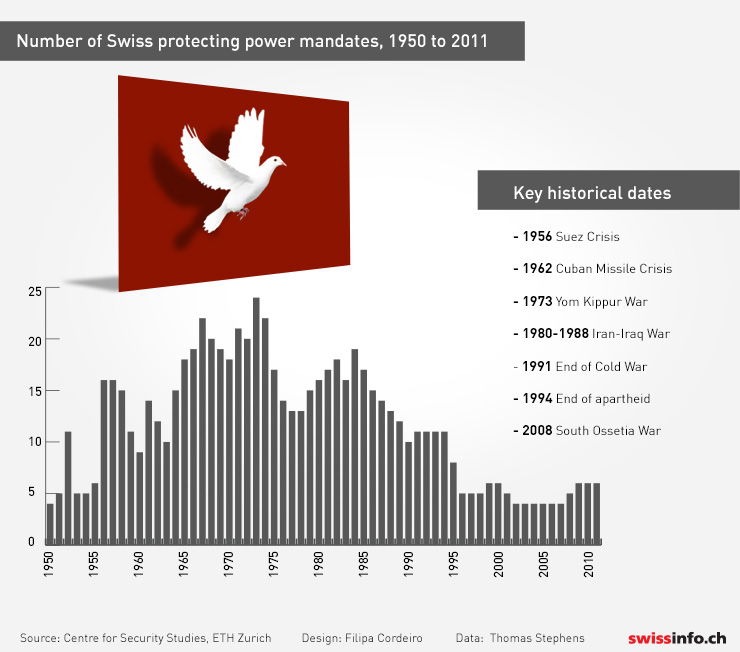‘Good officer’ looks back on Tehran role

The former Swiss ambassador to Iran, where Switzerland looks after the interests of the United States, tells swissinfo.ch why there’s always self-interest in providing services which are useful to others.
Philippe Welti, now retired, also talks about trust, pressure – and the stupidest thing warring countries can do.
swissinfo.ch: The number of Swiss protecting power mandates is decreasing – there are now six, down from more than 200 during the Second World War and 24 in 1973. Why is this?
Philippe Welti: From 1940 to 1945 you had a general war situation in the world – especially the world surrounding Switzerland. And that’s the background against which good offices of that sort, protecting power mandates, are absolutely needed.
When two countries declare war against each other, the first thing they do is break diplomatic relations. That’s the silliest thing they can do – but that’s what always happens. The correct thing would be the opposite: if you’re at war, you should strengthen the diplomatic channel to be able to talk to each other.
So, as soon as two countries break diplomatic relations, the need to look after relations becomes more urgent since you’re not doing it yourself. You need a third party to do it and since Switzerland was not party to any of the battles in the 1940s, it was seen as particularly appropriate to ask the Swiss to look after various interests.

More
Adjusting to the changing face of conflicts
swissinfo.ch: Why does the Swiss government pursue the good offices strategy? Is it worth it?
P.W.: First, we want to be helpful. If the world needs [good offices], we’re happy to provide them. This might sound naive, but it’s certainly true.
It’s also a good opportunity to remain in the minds of other governments as something of a useful unit – because normally when others are at war with each other, third parties become marginalised. And in the case of the Second World War, the marginalisation was very dramatic because it turned into a hostile attitude against Switzerland: ‘you’re not in our coalition, an ally, therefore you must be useful for the others’ – this was sometimes the assumption. In 1945, after the war, the general mood towards Switzerland was not so positive, because it was seen as a moral war more than the First World War.
So there’s always self-interest in providing services which are useful to others – it strengthens our position: we’re not just profiteers but we try to be helpful.
swissinfo.ch: So the good offices have improved Switzerland’s reputation?
P.W.: Sure. They have always been seen as one tool to improve our reputation.
Philippe Welti was born in Zurich in 1949 and joined the diplomatic service in 1979.
In 1996, he was appointed Deputy Head of Mission at the Swiss embassy in Bonn, Germany.
He later headed the Directorate for Security Policy of the Department of Defence in Bern and frequently represented the Swiss defence minister at meetings of the Euro-Atlantic Partnership Council.
From 2004-2008 he was Swiss ambassador to Iran and until 2011 ambassador to India.
He is father of successful singer-songwriter Sophie Hunger.
swissinfo.ch: Turning to Iran, from 2004 to the end of 2008 you were ambassador to Tehran, one of Switzerland’s most high-profile diplomatic missions. What were the biggest challenges?
P.W.: To reduce a protecting power mandate to its [essence], it is sitting somewhere and doing whatever the mandate giver asks you to do – and nothing more.
In the case of Cuba, we represent US interests in Cuba and Cuban interests in the US. In the case of Iran, this is not so – which is more normal. We look after the US interests, and the Iranians in 1980 chose Algeria as their protecting power. They then fell out with each other, Iran cancelled the mandate and picked Pakistan. So the Pakistan embassy in Washington looks after Iranian interests and the Swiss embassy in Tehran looks after US interests.
The basic requirement to be able to do this is to provide a communication channel which has three conditions: it has to work technically, so every hour of the day and night messages should be able to pass through it. Also it has to be completely confidential, and it has to be completely unbiased and loyal to the message – because when it’s an oral message there’s always the potential for the third party to change it. Nothing of me should be in the message.
swissinfo.ch: How much of your day was taken up by the good office?
P.W.: I would say it was a third of my work. But there were always two fields of interest: there are the consular interests and the diplomatic interests. The former concern citizens – so if an American citizen happens to be imprisoned in Iran, that would be a case of consular interest and consular protection. And for this purpose as part of the embassy we have a US consular interest section.
Diplomatic interest has nothing to do with citizens but with governments – if the government in Washington wants to ask the government in Tehran a question or whatever. This is carried out by the ambassador personally. So I would carry the message to the Iranian authorities, in practice the foreign ministry.
I had an 11-person section looking after US interests and they looked after consular interests of US citizens. When it became political, we’d call it diplomatic and I would do it personally – even typing it myself when there was something to be written.
1936: Switzerland opens embassy in Tehran.
1979: Islamic revolution in Iran; students hold staff of US embassy hostage for 444 days. US breaks off diplomatic relations.
1980: Switzerland starts representing Washington’s interests in Iran, and providing consular assistance to US citizens in Iran.
2008: Swiss Foreign Minister Micheline Calmy-Rey in Iran to attend signing of gas agreement, sparking widespread criticism at home and abroad.
August, 2010: Switzerland adopts UN-imposed sanctions against Iran after it refuses to suspend its nuclear programme.
January, 2011: Swiss agree to step up sanctions in line with those imposed by the US, the EU and some other countries.
July, 2012: Swiss step up sanctions, but short of ban on trading in crude oil.
swissinfo.ch: Switzerland played a significant role in the 2011 release of two US hostages held in Iran.
P.W.: I don’t use the word hostage: people who got arrested. We had those during my time as well. And then because it can draw a lot of public attention, it can put the US government under domestic pressure, and then a case which should basically be consular becomes diplomatic – when Washington gets involved and the Swiss ambassador in Tehran has to act.
swissinfo.ch: How much pressure were you under in these situations?
P.W.: It’s not a moral pressure in the sense of having to succeed. It’s the pressure of doing things – of acting sometimes on a daily basis.
swissinfo.ch: Overall, how do you look back on your five years in Tehran?
P.W.: This was, regarding interest, the peak of my career. I hold very fond memories because it was acknowledged by Washington – I could experience this personally when I was there twice a year for consultations – and it was also acknowledged by Iran.
You see, there is one special aspect in the protecting power mandate: when the US government asked the Swiss government whether it would be prepared to take over that mandate for them in Iran, this was the expression of a very high degree of trust. But this is never just a bilateral thing – it is always trilateral because such a mandate cannot be carried out if the receiving state – that is the host country, in this case Iran – doesn’t agree. It has to be asked whether it agrees that a third country, Switzerland, should be allowed to represent US interests on the territory of the Islamic Republic of Iran. So it also requires a very high degree of trust on the Iranian side.

In compliance with the JTI standards
More: SWI swissinfo.ch certified by the Journalism Trust Initiative










You can find an overview of ongoing debates with our journalists here . Please join us!
If you want to start a conversation about a topic raised in this article or want to report factual errors, email us at english@swissinfo.ch.